It’s a hard time of year to write; it’s a hard time of year to get enthused about anything; and, if you’re like me and your best thoughts tend to be sparked by seeing things and talking to people, the strangely lonely and discomfiting last stretch of August is a bummer. It’s left me with not too much concrete to talk about.
Thus I decided to take the opportunity to talk about how I talk about things. If it’s boring, apologies. After Labor Day, back to normal.
Right as I was starting the Spigot experiment, people asked me on two nights in a row about my critical “vision.” Strange, I thought, that I was expected to have one. My immediate response in both cases was, I don’t believe in visions. I was semi-sentient for postmodernism’s first run—Lyotard, the death of metanarratives, etc.—so my suspicion of the overarching is pretty engrained. I believe not in vision but in rhetoric, with hopefully some logic under the hood. I tend to think tactically rather than strategically, admittedly to my detriment careerwise. I’m a skeptic.
In the abstract, you would think that my disdain for “vision” would be common. Quite the contrary: it seems to me that people are dying for someone to tell them what to believe at the moment. The second they find a savior, they’ll be ready to build them a new church.
While I can’t offer anyone a transformative worldview, I can provide a few basic tenets I subscribe to. These aren’t things I think much about consciously, perhaps because—again to my detriment—I’m not always thinking about branding and marketing myself. I’ll start at the bedrock, with things that may seem obvious but seem surprisingly not automatically held.
First, there’s no real hierarchy and anything is equally worth interpreting as anything else. Your kitty cat holds as potentially many insights as a Goya as a can of Goya beans (which, fuck that guy) as the Latourian agglomeration of the subway system. Pretending that there’s any ultimate value is stupid. Moreover, it’s stupid to act like any of the value we ascribe to certain objects within aesthetic categories is real. We can believe that some works are better than others, in well-reasoned ways or silly ones. Criticism is, in effect, just lawyering, making an argument in the most persuasive way possible.
(You would think I wouldn’t need to say any of the above, but there’s a real strain of conservatism floating around these days. Note that I did NOT say fascism, thanks!)
Second, while everything is equally valid to discuss, I’m interested in thinking and writing about objects created for aesthetic/symbolic reasons—things that have no point. Why? I don’t know. I don’t think it makes me better or smarter than other people. Maybe I don’t like the practical world all that much. Some things about our characters just are, after a while. And art is the universe that, through a mixture of chance and choice, I happen to be in. It offers the best balance of fun, hot, and intelligent, so far as social options go.
Subsidiary point: To carry over the lawyering analogy from (1), you have to know your jury. Mostly I’m interested in a “jury,” or readership, of people who have some intellectual commitment to art. I tend not to dabble in “cultural criticism” about THE WAY THINGS ARE NOW or personal essays or celebrity profiles or the issuance of manifestos about THE WAY THINGS SHOULD AND MUST BE. These things are fine in their own right. But I more than vaguely distrust the musings of people who one day make pronouncements about the sad fact that millennials can’t get laid (straight people problems, I say) and the next day make bold pronouncements about art.
Third, and continuing from the above, I think expertise is important. This is perhaps the most controversial (LOL) thing I have to say. But yes, I think it’s important to know stuff. Despite the fact that traditional institutions are fucked places, and as noted above, canons are fictions, it’s not the institutions that are inherently fucked; it’s more that by and large we, people, are inherently fucked, and we carry institutions and their ideologies inside us—the cop in your head. In any case, I do indeed buy into the idea that it’s better to know a lot about a subject if you want to talk about it.
Corollary from this: Specificity is crucial in writing overall and in criticism particularly, since criticism so easily slips into unsupported or ill-supported generalization.
Is there more? I’m sure. One thing that sticks out is the fact that I’m giving logic a big bear hug, which I suppose makes me a prisoner of the Enlightenment. In fact I’m a lot more open to junking the whole reason thing than the above may suggest. But this is too long already, and if I kept on going, I would no doubt reveal that in fact I do have have a grand vision and prove myself a hypocrite on the subject. Maybe this whole piece of writing is a glorious self-own.
One thing I do believe, actually, is that in the end we’re all hypocrites—a humanist corollary of Gödel, to blatantly misappropriate a completely unrelated discipline. Thus I’m sure I’ll reverse myself in some comical way before the month is out. And I’m sure there are any number of observers who can disassemble my positions typing only with their middle finger. That would be good, since social-media engagement is good. Just as much as people crave vision, they also crave petty argument.
Wine
Sikele Terre Siciliane Grecanico 2020. Tucked into the garbage pile on the kitchen island at an otherwise thoroughly elegant housewarming I recently attended—you know it’s chic when you see red Solo cups—was a drained bottle of Sikele, an orange wine that’s been a staple of my consumption in the last few years. Orange wines can be annoying; they’re past trendy, some of them taste like cider, and they don’t go well with food, if you’re one of those people who likes to eat.
However, because of my moth-to-flame attraction to esoterica, I like orange wine. Sikele is a cheap, well-distributed, and palatable example, perfectly middle-of-the-road savory, a little salty and nutty. IMHO the best orange wine is the also easy-to-find Paleokerisio, which is from Greece near the Albanian border and comes in adorable 500 ml bottles. But no one brought Paleokerisio to the party, so Sikele is what you’re getting.
Music
Long Season Live—Fishmans. My friend Maya goes through phases where she posts the music she’s listening to on IG. These are times when I learn a lot. Last week she got on an ’80s–’90s Japanese semi-experimental kick—Yellow Magic Orchestra, Haruomi Hosono (who was in YMO with Ryuichi Sakamoto and Yukihiro Takahashi), and this group I’d never heard of called Fishmans. Get lost in this prog–indie rock–trip hop suite of theirs. It’s great for this time of year when you just want to ease painlessly out of your fucking body.
Maya also happens to run an excellent art space in Athens with Otobong Nkanga called Akwa Ibom. Sorry Maya, I guess I should have told people about it months ago when every art-adjacent asshole started posting photos of their Greek vacations! Note: I love you assholes, I’m just mad I couldn’t afford to go myself.






